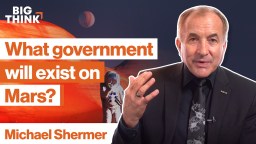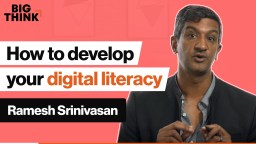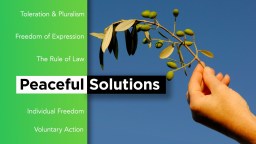PETER JAWORSKI: Voluntary action is about peaceful interrelationships between persons. There's a broader question about voluntary action which has to do with whether or not all of our actions are voluntary. Other related questions, for example, if I'm in the middle of a hurricane and the hurricane forces me to go somewhere then in a sense my actions are not voluntary. They are forced. Plenty of classical liberals have opinions about whether or not we have free will or whether or not our actions are predetermined by other facts. Nevertheless when classical liberals talk about voluntary action they're talking about interpersonal relationships. They're talking about the authority and legitimacy of government, of governments everywhere to be able to make people do what they don't want to do. Voluntary action says that the scope of legitimate government authority is extremely narrow. We should maximize or at least try to have as much as possible voluntary interactions with people, and that applies to government just as surely as it applies to what we do with our friends and our neighbors.
It's worth looking at the countries around the world that are considered the freest. So I'm thinking about countries like Norway, countries like Canada, New Zealand, Australia. Those countries have incredible economic freedoms. They're in the top ten for economic freedom. And you'll notice that those countries do better with respect to wealth, with respect to health, even with respect to self-reported happiness scores. They do this annual survey about people's happiness, and people report that they are happier in those countries. And not only are those countries more economically free than some of the other countries in the world, they also have greater civil liberties, as well. And both of those types of freedoms – civil liberties, as well as economic freedoms – both instances where we live by the mantra that we should interact peacefully and voluntarily and without making people do what they don't want to do, I think that makes people better off.
The founders of the United States Constitution and the founders of Canada as well, I'm Canadian. The founders of Canada, especially former Prime Minister Wilfrid Laurier, they believed that our interactions ought to be voluntary. And that means significant restrictions on what the government is permitted to do. One thing that's controversial at the moment but is less controversial amongst classical liberals is the extent to which governments can restrict who may immigrate and who may leave. Immigration is the subject of a lot of controversy. But for classical liberals the question that they ask is, what right does a government have to stop somebody who would like to move from one country to another, especially if they're someone in the immigrating country, in the home country, that would like to extend an olive branch or would like to ask that person to come into that country? Immigration is a sensitive topic and not all classical liberals agree with one another on this issue. But just as we don't have a right to tell our neighbors that they can't go and that they can't move to another house or that they can't move from one state to another or one province to another, so too does the government fail to have the right to prevent people from coming here if they so choose.
Take me as an example. I was born in Poland. It was communist Poland so they didn't take voluntary action very seriously at all. And my family escaped Poland when I was six years old, and we declared refugee status in Germany. And as soon as we arrived in Germany and as soon as our refugee application was accepted we filed paperwork to move to a free country. And that free country is, of course, I'll pause, Canada. Yes, you've got it right. That's right. We wanted to move to Canada. It took Canada three years to process our request for immigration. And then finally we were permitted to move to Canada. And so when I was nine years old I finally got an opportunity to move to Canada.
The issue of immigration is personal to me. I've had personal experiences with both being an immigrant and being a refugee. At the moment I'm a green card holder in the United States so I've immigrated so much, I basically consider myself a person who is just an immigrant, right. I don't, I mean I do feel a strong kinship with Canada. When people ask me who I am I say I'm Peter and I am Canadian. Nevertheless, I also feel kinship with people who are stuck in situations through no fault of their own that they want to get out of not just for their own sake, but for their family's sake as well. That was true of my mother and my father. They didn't really want to leave Poland. Things were fine for them in Poland. But they thought about myself and they thought about my sister and they thought that like, we need to get out of Poland. We need to move to a country that is a free country. A country that is open to immigrants. A country that is open to refugees. And we chose Canada for that reason.






